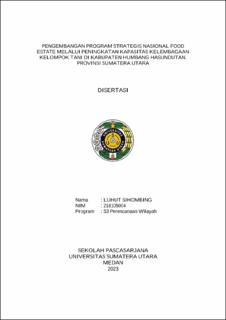| dc.description.abstract | Indonesian government has set food estate program as one of the national strategic
programs to improve food supply post COVID-19. This program has consumed much of
the budget from central and regional government as a mean to increase food production,
create jobs, and improve farmers well-being. The management of food estate region was
done by approaching the formal farmers union institution. Thus, one of the keys to the
success of this program depends on the institutional capacity and performance of the
farmer groups.
This was an explanatory study with associative approach where data was obtained
through survey. Non-probability sampling was used in this study, taking the census
sampling by including all active members of the farmer groups. Context, Input, Process,
Product (CIPP), Analytical Hierarchy Process (AHP) dan Structural Equation Modeling
(SEM) evaluation models were used for data analysis.
The study showed that the activities accomplishment of food estate at Riaria village,
Pollung sub-district, Humbang Hasundutan regency, Sumatera Utara was classified as
good. Farmers performance was on a growing level and the priority strategy to improve
food estate is by improving the institutional capacity of farmers group, cooperating with
industry, and funding. Group dynamics, role of instructors, members capacity, members
characteristics, role of group leader, and members participation variables were the
significant discriminant on the farmers institutional capacity in the management of food
estate region. The business system and institutional capacity directly affect farmers
well-being, both positively and significantly. The institutional capacity also positively
and significantly affects the moderation of business system on the improvement of
farmers well-being in food estate program. | en_US |


